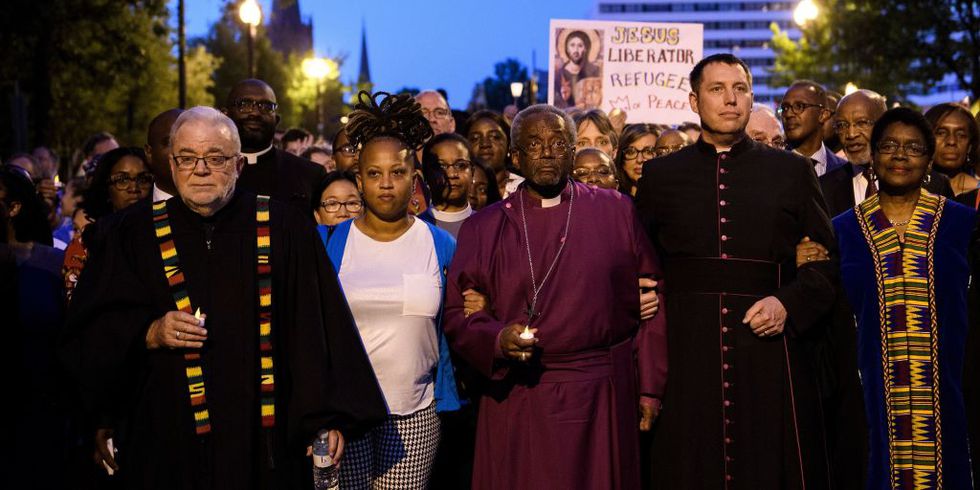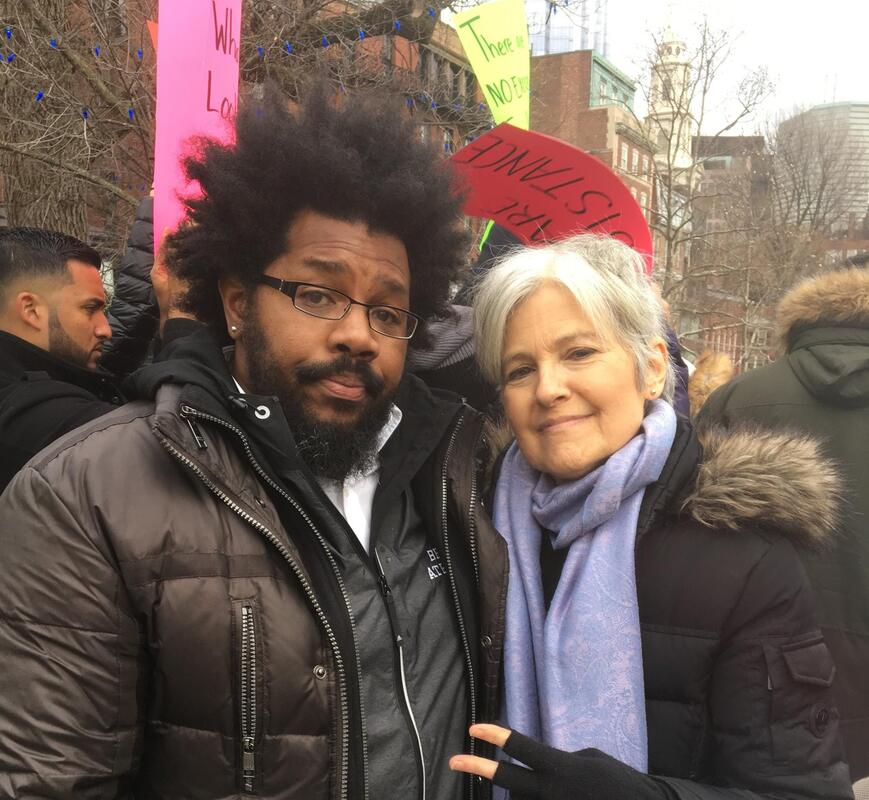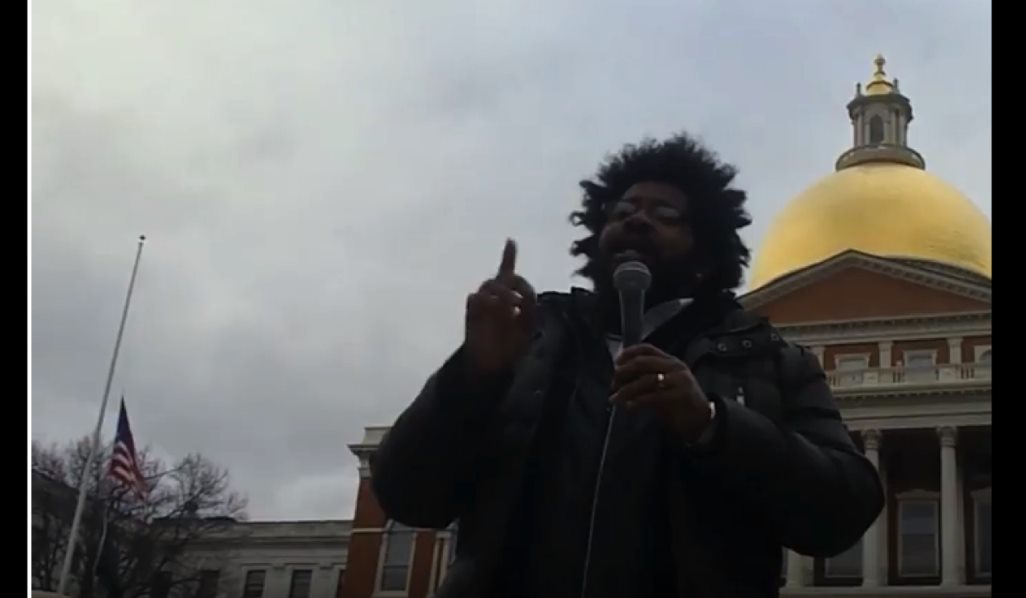I am speaking to a crowed about Radical Love and what is needed in our current age; I got to hang at the rally with this dope sista, while keeping it real on a mucho cold day with Green Party presidential candidate Jill Stein.
 There are those standing up for their faith — and truth, and not the idolatry of politics as God. Bishop Curry, who stated that “…. We are Christian leaders bearing moral witness to the teachings of our faith in the public square…. As citizens we want our government to reflect our values. As a Bishop I believe we should follow the teachings of Jesus — who taught us to love God and love our neighbor…. The normalization of lying presents a profound moral danger to the fabric of society. We believe authoritarian political leadership is a theological danger that threatens democracy and the common good — and we will resist it.”
In truth I have recently come to know of him; however, since I have watched him protest in front of the White House demanding justice and advocating for human rights. I am one who hates complacency. I have committed myself to defending the weak: homelessness, marginalized, etc. Let us dedicate each and everyday to being better humanists. “Of all the forms of inequality, injustice in health care is the most shocking and inhuman.” Dr. Martin Luther King Jr. “When we speak, we are afraid our words will not be heard or welcomed. But when we are silent, we are still afraid. So it is better to speak”. Audre Lorde In high school, when I became intellectually conscious of the color line, and the binary conditions that set my family, the have nots, apart from the the haves, I paraded the interracial change agents I admired to anyone who would listen. Pondering the motives that divide people, I found then a home in my ideals of radical love. A frequent reader of W.E.B. Du Bois, who proclaimed “the problem of the 20th century is the color line” to my misguided comprehension of Joseph Conrad’s complex fictional character Jim, and Richard Wright’s Bigger Thomas— I fell in love with the oppressed and the underdog. I suspect that is why we love fictional Rocky Balboa or Shirley Muldowney, the first woman of Drag Car Racing, and not the haves like fictional Ivan Drago, or the mean kids in the movie, Karate Kid. As humanists, we are inspired by our sense of empathy—wanting to see our better selves in others, as they triumph through struggles. Since high school, I have made it my life’s ambition to remain with the have nots, though I have benefited from the sacrifices and compassion of my working class parents. Both who endured their economic and racial conditions of the deep South, only to marginally usurp the barriers of classism, racism, and the caricatures of Jim Crow America. Much like the miracle on ice narrative, they too triumph. As humanists, here in the age of the Coronavirus, we are positioned to have compassionate emotions. With crisis comes empathy, particularly when it takes a stand where we are, from within the perspective of our most significant concerns. Rousseau, an 18th century French philosopher, articulated our commonality by expressing how nobles of France lacked compassion for the lower classes because they “count on never being human beings”.[i] His articulated point is often felt by those who lack the human necessity and compassion to see people as human—while we must see each other as nothing less than human, by acknowledging the beauty of our differences: Race, ethnicity, class, gender, and sexual orientation. It is therefore the knife that unknots and allows the most ubiquitous formulation of all: Community. Community and our sense of it is what makes it truly ubiquitous. As I recently noted in a talk I gave to a large Unitarian Universalist church in Newburyport, both individuals and communities matter. We must let people tell their own stories, and in doing so—we must not interpret their story for them. We must listen for criticism, but also listen to perceive resilience, beauty, faithfulness, dignity and forgiveness. These are the building blocks for any true community. As humanists, we must further receive the echoes of Audre Lorde. Therefore, we must speak. We must speak using a love language that conveys community—but we must not drown out the silent. By walking alongside our neighbors, regardless of race, class, gender, or sexual orientation, we have moved from talk to the direct action of caring. Martin Luther King, Jr. invoked his voice by demanding that people see the weak, homeless, oppressed, sick, and vulnerable in society. Humanists cannot exist on an island—nor in isolation. Humanists have the capacity to build communities regardless of the barriers put in place. We hear a great deal about the cruelty of those who name call, promote hate, and target populations because they are “perceived” to be blamed for Coronavirus. As a community of humanists, we are obligated to participate in a reductionist approach to addressing such vice and ills that are often inculcated into the fabric of human societies. Intergroup cooperation and an individual desire to educate him/her/they on multicultural practices is a start. In conclusion, each member of a community must always seek to answer the following questions:
Notes [i] Martha C. Nussbaum, Hiding from Humanity: Disgust, Shame, and the Law, (Princeton: Princeton University Press, 2004), pg. 51. [ii] Caprice Hollins and Ilsa Govan, Diversity, Equity, and Inclusion: Strategies for Facilitating Conversations on Race, (New York: Rowman & Littlefield Press, 2015), pg. 56. |
AuthorThis blog reflects the views of a soul brotha who believes in radical love. I must confess a love for Black & brown folk, gay folk, bi & transgender folk, Asian folk, non-binary folk, and my white allies. Archives
February 2023
Categories |


 RSS Feed
RSS Feed